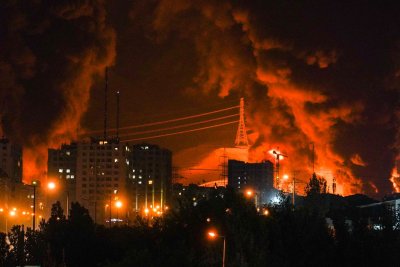
Major General Ali Shadmani, chief of staff of the Iranian Revolutionary Guard Corps’ Khatam al-Anbiya Central Headquarters, was appointed as the new head of the IRG’s Emergency Command to replace one of the five of Iran’s most senior military commanders killed in the initial phase of Israel’s surprise attack early Friday. Photo courtesy Supreme Leader of Iran’s office via EPA-EFE
June 17 (UPI) — Israel claimed Tuesday it had killed Iran’s highest-ranking military chief after just days in the job in an airstrike by Israeli warplanes.
“Ali Shadmani, Iran’s senior-most military official and Khamenei’s closest military adviser, was killed in an Israeli Air Force strike in central Tehran, following precise intelligence,” the Israel Defense Forces said.
Shadmani was appointed as the new head of the Iranian Revolutionary Guard‘s Emergency Command to replace Gholam Ali Rashid in the hours after Rashid was among five of Iran’s most senior military commanders killed in the initial phase of Israel’s surprise attack early Friday.
Supreme Leader Ayatollah Ali Khamenei is the commander-in-chief of the country’s armed forces.
The development came as both sides continued to trade deadly attacks into a fifth day — Israel leveraging its stranglehold on Iranian airspace to ramp up its airborne assault on key military and nuclear targets while Iran launched 30 ballistic missiles with blasts reported in northern Israel.
Israel’s health ministry said another 154 people had been injured overnight, with 149 admitted to hospital in a moderate condition or with only minor injuries.
However, Israel said there had been noticeably fewer missiles incoming than on previous days.
Two dozen people in Israel have been killed since Friday, mainly in missile strikes on residential districts in the center and north of the country, while Iran’s Health Ministry says Israel’s attacks have killed 224 people and injured more than 1,200, mostly in Tehran.
Speaking to reporters aboard Air Force One after cutting short his meeting with world leaders at a G7 summit in Canada to head back to Washington, President Donald Trump, in a somewhat cryptic comment, denied an Israel-Iran truce was afoot, saying “we’re looking at better than a cease-fire.”
Before departing Calgary, Trump had told Iranians they needed to evacuate Tehran immediately.
Analysts were trying to figure out whether Trump intends to try to go the diplomatic route and get Tehran to return to the negotiating table to deal on its nuclear development program or double down on his support for Israel.
Iranian President Masoud Pezeshkian issued renewed but vague threats Tuesday, warning Iran “will have to show more painful responses,” unless the United States reined in Israeli aggression and repeated the claim that none of what was occurring could take place without Washington’s involvement.
“If the U.S. government does not prevent the spread of insecurity to the region by bridling that savage [Israeli] regime, Iran will be obliged to give heavier and more painful responses beyond what has occurred so far,” Pezeshkian warned in a call with Omani sultan Haitham bin Tariq.
Oman has been hosting talks on Iran’s nuclear program between top U.S. negotiator Steve Witkoff and Iranian officials that began in April.
Pezeshkian insisted all regime officials, political factions of all persuasions and the people of Iran were willing the armed forces to succeed in their fight against Israel.
Israeli Prime Minister Benjamin Netanyahu, similarly, gave away no indication of wanting to end the conflict any time soon, saying Israeli air power was operating freely while the city of Tehran burned.
“The Israeli Air Force controls the skies over Tehran. We strike regime targets — not civilians. That’s the difference between us and Iran’s terrorist regime that aims to murder women and children,” he said in a post on X.
“I am proud of our security forces and our wonderful people. Together we will win.”
At least two European countries have already begun implementing plans to evacuate their citizens from the region.
A Czech government evacuation flight touched down Tuesday with 66 people on board, according to Defense Minister Jana Cernochova, with another 11 due to be brought out on a Slovakian government flight in the coming hours.
Another flight that landed in Bratislava from Jordan on Monday evening had 14 other Czech citizens aboard.
Poland is sending planes to collect up to 300 of its nationals who have asked to be repatriated from Israel, Foreign Minister Radoslaw Sikorski said Monday.
Deputy Foreign Minister Henryka Moscicka-Dendys said initial evacuations would be via Egypt and Jordan, with a government-chartered aircraft due to depart Sharm el-Sheikh early Wednesday, followed by a military flight out of Amman on Thursday.